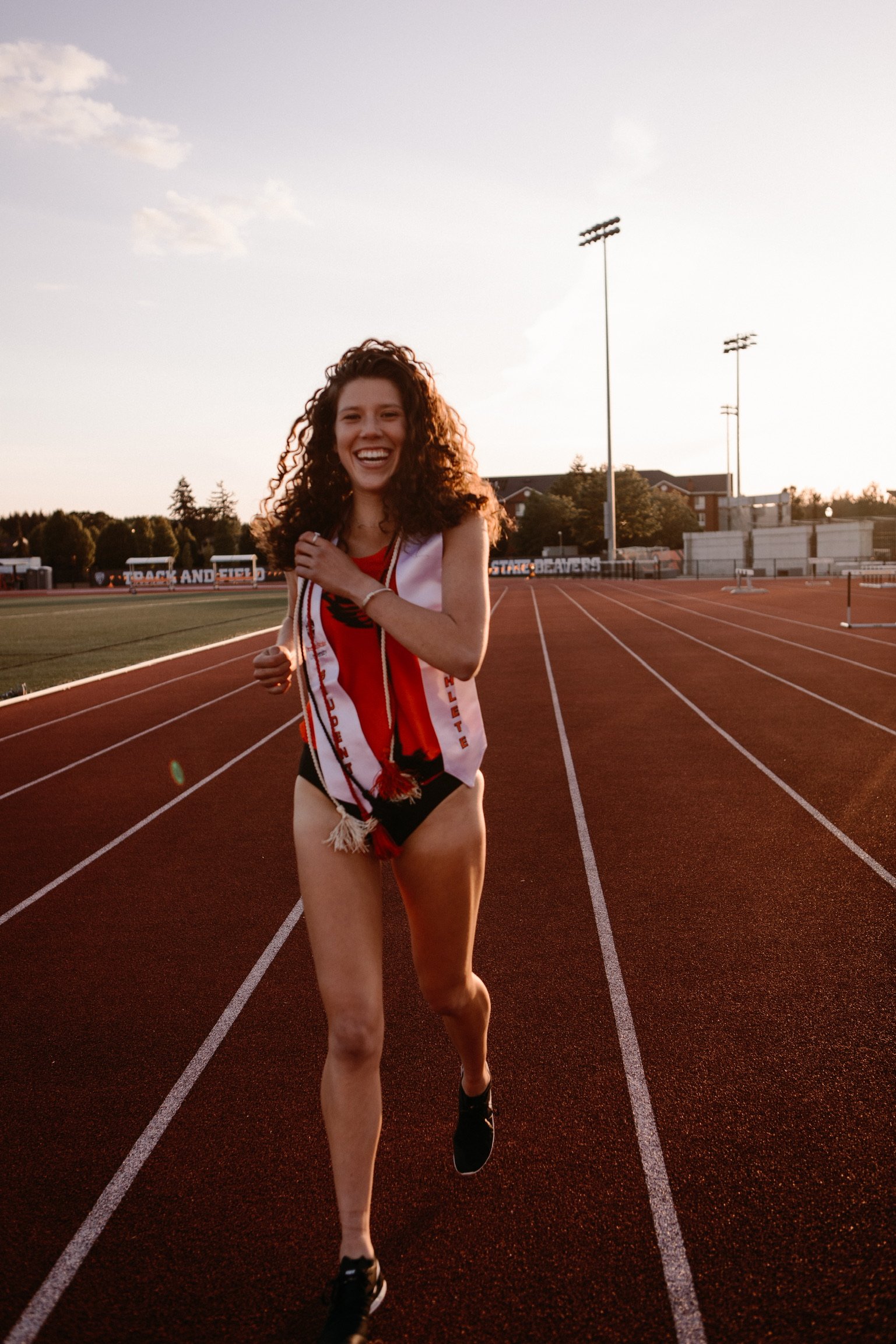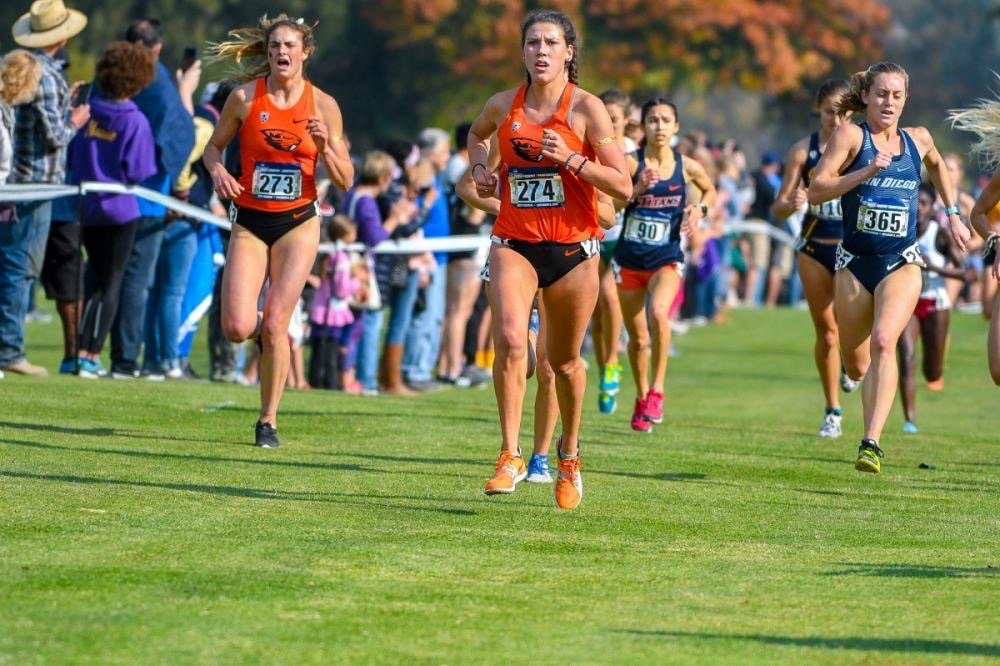Body image as a track and cross country runner with Audrey Lookner
Audrey Lookner ran track and cross country at Oregon State. She recently graduated in June of this year, 2022, with her degrees in Public Health and Bio Health Sciences. She is from Colorado where she ran for a great program in high school. At home she has a German Shorthaired Pointer puppy named Charlie. In her free time she enjoys hiking, being outside, traveling and she’s found a newfound passion for lifting. In this podcast we will be talking about placing your worth on your sport, performance anxiety as a team captain, struggles with body image, and finding a passion post-sports in work.
Below I have written most of what we talked about but you can listen to the full podcast on Anchor / Spotify or on Apple Podcasts.
Q: How did the way you grew up affect how you placed your worth on your sport?
A: I grew up always in sports. I played soccer until high school. Both of my parents are runners. My mom has done two Iron Man’s.
They’ve both done a bunch of marathons so it’s always been something we did together. There was never a pressure to perform.
My sister did soccer as well and we did it just for fun. I joined cross country to stay in shape for soccer mostly for fun and to stay in shape.
My freshman year of high school I made it to Nike Cross Nationals with my team and it was my first realization that this is a big deal.
I’ve never seen success like this with soccer. I kind of pivoted after my freshman year of high school to solely focus on running.
My parents both just did it for fun so they never placed that pressure to perform.
To this day my mom will still ask me what distances I ran.
They were always there in the supportive role. I had self placed pressure based off comparison to myself and other people.
My best friend to this day is a runner. It was a healthy competition but we always compared ourselves to each other because we were always neck and neck.
We all take pride in what we do.
Placing all of your worth and focusing all on one thing can be detrimental.
It can seclude you from a lot of other passions. College athletics kind of forces you in that.
In cross country and track I was competing year round. There was not time to explore other passions.
No matter how much the athletic department says to diversify yourself and to be a complete person.
When you don’t have enough hours in the day to do that, there’s not a lot you can do.
Q: In what ways have you struggled with finding passion post-sports in work?
A: It’s hard. It’s a large transition. I think I did myself a little bit of a disservice when I graduated because I jumped right into working.
I went from my last race, to graduation, to working a full time job. I think it has helped, though since I haven’t had time to dwell on it.
My last season didn’t go as well as I wanted to but my body was so tired when I was done that helped.
You’re dong it with your best friends, traveling around the country, and there’s a tangible gaol.
I haven’t found that in work as much. Most of my work now is in front of a computer.
That is not what I am used to as an athlete moving around all the time.
My first job was not challenging and it wasn’t checking all of the boxes for me.
I did find a new job in sales and I’m hoping that having that competition with getting different accounts will ignite that passion that I had with sports.
That’s why we all competed was that drive to succeed and compete against the next best person.
Q: How did being a team captain affect your performance anxiety?
A: Being a team captain was very fun but it also had its drawbacks.
I think there was an unspoken pressure that I had to achieve.
A lot of people came to me with how they were feeling, like if they were nervous or worried they wouldn’t do well.
I had those same fears but I wasn’t able to express them in the same way.
Everyone thought of me as a “strong person” but I think that almost contributed more to my negative mindset in a way.
I would think that I was going to not do well. I have one memory in particular after a really poor race where I did not feel well physically or mentally.
My coach approached me and told me that he needs me to pull it together for the team.
I know that he meant it that I’m a team captain and I mean a lot to this team.
In that moment I needed him to look at me and say that it’s okay to have bad days and it’s okay to not hold it together for everyone else.
I wasn’t able to feel all the feelings I was feeling and hold it together for the girls that were two or three years younger than me. That was hard.
Q: What was your experience with struggling with body image? What advice do you have for someone that may be going through that right now?
A: With an aesthetic based sport like running, it’s hard not to compare yourself to what the person next to you looks like.
I hit puberty really late and went to a college with a body I wasn’t used to.
I got injured the end of my freshman year and then got into a pretty toxic cycle of watching what I was eating and overexercising.
It tanked my body image and what I thought an ideal runner should look like. I would not wish that on my worst enemy.
I’m still struggling with the repercussions today.
Some advice I would give to someone struggling with that today is that every body is different.
No matter what social media says, what your coach says if they’re saying anything, every body is different and every body deserves fuel.
It’s a cycle that you don’t want to start. It’s okay to have those days but don’t let it be a defining factor of your days.
It does pass no matter how much you feel like you’re drowning in those thoughts.
One of my friends eventually did say something to me and it did kind of snap me out of what was going on.
Your friends do care about you. If you are struggling, reach out for help because it’s always better to get help in the beginning rather than months or years down the line.
Q: What was one of your favorite moments while competing?
A: My favorite moment was when our team made it to nationals for the first time in school history.
It was my coaches second year there and it was also my second year there. We were complete underdogs.
We had somehow gone to Wisconsin and outperformed a lot of good teams.
We got some points that ended up pushing us into nationals at the regional meet.
My head coach and my assistant coach came running up to me and Lexi and said “we made it!”.
Both of us were bursting into tears and hugging and crying.
It was that success moment. We were all so tired and so exhausted but we did it together.
Now we get to go compete in this huge national meet that none of us have ever experienced before and now we get to go do it as a team. It was so cool.
Q: What was the transition out of playing competitive sports like for you? What did you do in your newfound free time?
A: The overall experience so far has been okay. I thought it was going to be a lot harder.
Not saying that it’s not hard. I was expecting a huge mountain to climb and I kind of transitioned out and went straight into working full time.
I kind of had a new distraction almost. My team did really well this year and they went to nationals.
It was really exciting to see that but it was hard to sit at home and realize that I won’t be able to do that again.
There are people that I ran with that are still doing it and I’m back to being a normal person. It’s a very odd sensation I would say.
My friends have kind of all distributed around the country.
That is hard because now you have to get on a flight to see each other instead of walking across the hall.
I’ve kept in contact with all of my really close friends on the team.
I have a couple of girls that are still running now that are younger than me and they send me updates.
Those texts mean the most to me. Making friends post college, if you figure it out let me know because I’m struggling with it.
I’m currently living with my parents which is hard. I also work from home at the moment which makes it hard to make friends.
I have some friends that I made in my previous job so I hope to keep in touch with them.
I’m actually moving out to Denver soon so I’m hoping that will get me out of my comfort zone and maybe I’ll go to some social events that I can make new friends at.
Q: What aspect of the transition out of sports was the hardest for you? What advice can you give to athletes on what you learned from that?
A: I think the hardest part for me was the motivation and not having the schedule.
You have a schedule that is designed for you to be fit and at practice with you.
Being in the real world and having a job that doesn’t give you three hours off in the middle of the day to work out is an adjustment.
I think finding times and finding activities that work best for you is my advice.
Not everyone is going to get into lifting, running, get on to a team sport when they graduate.
It can be little exercises like going for a walk.
That is still moving your body.
It doesn’t have to be vigorous one to two hour things that we have known for so long.
I think that was the biggest struggle for me was learning how to listen to my body and not to push to that max degree like we were taught for so long.
Having fun with it and not making it all about winning.
If you have any more questions for Audrey, please leave comments below or contact me. If you or someone you know is struggling, please call or text the Suicide Hotline. It’s toll free and available 24/7 at 988 or 800-273-8255.
Rose Medal’s mission is to provide resources and support for current and former athletes. Please support our mission by making a donation. We are a 501(C)3 nonprofit so your donations are eligible to be tax deductible.
Are you or someone you know currently struggling with what happens in life after sports? Or did you already go through that transition to life after retiring competitive sports and wish you had more resources and support? Have you ever wondered, “what do athletes do after they are done playing sports? What’s next after sports?” Do you feel like you dedicated so much to your sport and you don’t know what to do now that you’re done competing? You’re not alone. Check out the site and join us in the journey. Once an athlete, always an athlete.
More blog posts you might like:





